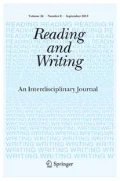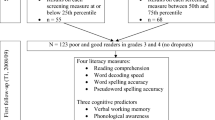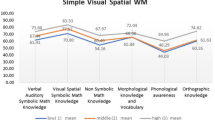Abstract
The goals of this study were to explore the deficits in working memory associated with literacy disorders (i.e. developmental disorders of reading and/or spelling) and the developmental trajectories of these working memory deficits. The performance of 28 children with literacy disorders was compared to a non-disabled control group with the same group size at five bi-annual times of measurement in a three-year-longitudinal study beginning at the end of primary school (9.5 years of age). Storage capacity and central-executive working memory were assessed in phonological and visual-spatial modalities, the latter under static and dynamic conditions. Overall, children with literacy disorders were outperformed by their typical developing peers in all phonological and in dynamic visual-spatial storage and central-executive tasks except for the static visual-spatial storage task. Results at single times of measurement revealed that the most consistent deficit was found in the storage capacity of the phonological loop. An additional central-executive impairment is supported by low backward spans. The causes for output deficits in dynamic visual-spatial tasks and good performance under static visual-spatial condition are discussed.
Similar content being viewed by others
References
Alloway, T. P., Gathercole, S. E., Adams, A.-M., Willis, C. S., Eaglen, R., & Lamont, E. (2005). Working memory and phonological awareness as predictors of progress towards early learning goals at school entry. British Journal of Developmental Psychology, 23, 417–426.
Baddeley, A. D. (1986). Working memory. Oxford: Oxford University Press.
Baddeley, A. D. (2007). Working memory, thought, and action. Oxford: Oxford University Press.
Baddeley, A. D. (2012). Theories, models, and controversies. Annual Review of Psychology, 63, 1–29.
Baddeley, A. D., & Hitch, G. J. (1974). Working memory. In G. H. Bower (Ed.), The psychology of learning and motivation: Advances in research and theory (Vol. 8, pp. 47–89). New York, NY: Academic Press.
Baddeley, A. D., Thomas, N., & Buchanan, M. (1975). Word length and the structure of working memory. Journal of Verbal Learning and Verbal Behavior, 14, 575–589.
Bayliss, D. M., Jarrold, C., Baddeley, A. D., & Leigh, E. (2005). Differential constraints on the working memory and reading abilities of individuals with learning difficulties and typically developing children. Journal of Experimental Child Psychology, 92, 76–99.
Beneventi, H., Tonnessen, F. E., Ersland, L., & Hugdahl, K. (2010). Executive working memory processes in dyslexia: Behavioral and fMRI evidence. Scandinavian Journal of Psychology, 51, 192–202.
Brunswick, N., Martin, G. N., & Marzano, L. (2010). Visuospatial superiority in developmental dyslexia: Myth or reality? Learning and Individual Differences, 20, 421–426.
Brunswick, N., Martin, G. N., & Rippon, G. (2012). Early cognitive profiles of emergent readers: A longitudinal study. Journal of Experimental Child Psychology, 111, 268–285.
Chuah, Y. M. L., & Maybery, M. T. (1999). Verbal and spatial short-term memory: Common sources of developmental change? Journal of Experimental Child Psychology, 73, 7–44.
Gathercole, S. E., Alloway, T. P., Willis, C., & Adams, A.-M. (2005). Working memory in children with reading disabilities. Journal of Experimental Child Psychology, 93, 265–281.
Gathercole, S. E., & Baddeley, A. D. (1993). Working memory and language. Hove: LEA.
Gathercole, S. E., Pickering, S. J., Ambridge, B., & Wearing, H. (2004). The structure of working memory from 4 to 15 years of age. Developmental Psychology, 40, 177–190.
Gebauer, D., Enzinger, C., Kronbichler, M., Schurz, M., Reishofer, G., Koschutnig, K., et al. (2012). Distinct patterns of brain function in children with isolated spelling impairment: New insights. Neoropsychologia, 50, 1353–1361.
Gölitz, D., Roick, T., & Hasselhorn, M. (2006). Deutscher Mathematiktest für vierte Klassen (DEMAT 4) [German test for mathematical skills in fourth grade]. Göttingen: Hogrefe.
Hasselhorn, M., & Schuchardt, K. (2006). Lernstörungen. Eine kritische Skizze zur Epidemiologie [Learning disabilities: A critical sketch on epidemiology]. Kindheit und Entwicklung, 15, 208–215.
Hasselhorn, M., Schumann-Hengsteler, R., Grube, D., König, J., Mähler, C., Schmid, I., Zoelch, C. et al. (2012). Arbeitsgedächtnistestbatterie für Kinder von 5 bis 12 Jahren (AGTB 5–12) [Working memory test battery for children aged five to twelve years]. Göttingen: Hogrefe.
Heim, S., Tschierse, J., Amunts, K., Wilms, M., Vossel, S., Willmes, K., et al. (2008). Cognitive subtypes of dyslexia. Acta Neurobiologiae Experimentalis, 68, 73–82.
Holm, S. (1979). A simple sequentially rejective multiple test procedure. Scandinavian Journal of Statistics, 6, 65–70.
Jeffries, S., & Everatt, J. (2004). Working memory: Its role in dyslexia and other specific learning difficulties. Dyslexia, 10, 196–214.
Keage, H. A. D., Clark, C. R., Hermens, D. F., Williams, L. M., Kohn, M. R., Clarke, S., et al. (2008). Putative biomarker of working memory systems development during childhood and adolescence. NeuroReport, 1, 197–201.
Kibby, M., Marks, W., Morgan, S., & Long, C. (2004). Specific impairment in developmental reading disabilities: A working memory approach. Journal of Learning Disabilities, 37, 349–363.
Klauer, K. C., & Stegmaier, R. (1997). Interference in immediate spatial memory: Shifts of spatial attention or central-executive involvement? Quarterly Journal of Experimental Psychology, 50, 79–99.
Krajewski, K., Liehm, S., & Schneider, W. (2004). Deutscher Mathematiktest für zweite Klassen (DEMAT 2+) [German test for mathematical skills in second grade]. Göttingen: Beltz.
Küspert, P., & Schneider, W. (1998). Würzburger Leise Leseprobe (WLLP) [Würzburg silent reading test]. Göttingen: Hogrefe.
Landerl, K., Fussenegger, B., Moll, K., & Willburger, E. (2009). Dyslexia and dyscalculia: Two learning disorders with different cognitive profiles. Journal of Experimental Child Psychology, 103, 309–324.
Landerl, K., & Moll, K. (2010). Comorbidity of learning disorders: Prevalence and familial transmission. Journal of Child Psychology and Psychiatry, 51, 287–294.
Lenhard, W., & Schneider, W. (2006). Ein Leseverständnistest für Erst-bis Sechstklässler (ELFE 1–6) [A reading comprehension test for first to sixth graders]. Göttingen: Hogrefe.
Logie, R. H. (1995). Visuo-spatial working memory. Hove: Lawrence Erlbaum.
Marzocchi, G. M., Oosterlaan, J., Zuddas, A., Cavolina, P., Geurts, H., Redigolo, D., et al. (2008). Contrasting deficits on executive functions between ADHD and reading disabled children. Journal of Child Psychology and Psychiatry, 49, 543–552.
Melby-Lervåg, M., & Hulme, C. (2013). Is working memory training effective? A meta-analytic review. Developmental Psychology, 49, 270–291.
Menghini, D., Finzi, A., Carlesimo, D. A., & Vicari, S. (2011). Working memory impairment in children with developmental dyslexia: Is it just a phonological deficity? Developmental Neuropsychology, 36, 199–213.
Moll, K., & Landerl, K. (2009). Double dissociation between reading and spelling deficits. Scientific Studies of Reading, 13, 359–382.
Muthén, L. K., & Muthén, B. O. (1998–2010). Mplus user’s guide (6th ed.). Los Angeles, CA: Muthén & Muthén.
Palmer, S. (2000). Phonological recoding deficit in working memory of dyslexic teenagers. Journal of Research in Reading, 23, 28–40.
Rutter, M., Caspi, A., Fergusson, D., Horwood, L. J., Goodman, R., Maughan, B., et al. (2004). Gender differences in developmental reading disability: New findings from four epidemiological studies. Journal of the American Medical Association, 291, 2007–2012.
Savage, R., Lavers, N., & Pillay, V. (2007). Working memory and reading difficulties: What we know and what we don’t know about the relationship. Educational Psychology Review, 19, 185–221.
Schuchardt, K., Maehler, C., & Hasselhorn, M. (2008). Working memory deficits in children with specific learning disorders. Journal of Learning Disabilities, 41, 514–523.
Schuck, K.-D., Eggert, D., & Raatz, U. (1975). Columbia mental maturity scale (CMM 1–3). Weinheim: Beltz.
Schweickert, R., & Boruff, B. (1986). Short-term memory capacity: Magic number or magic spell? Journal of Experimental Psychology: Learning, Memory, and Cognition, 12, 419–425.
Siegel, L. S., & Ryan, E. B. (1989). The development of working memory in normally achieving and subtypes of learning disabled children. Child Development, 60, 973–980.
Smith-Spark, J. H., & Fisk, J. F. (2007). Working memory functioning in developmental dyslexia. Memory, 15, 34–56.
Smith-Spark, J. H., Fisk, J. E., Fawcett, A. J., & Nicolson, R. I. (2003). Investigating the central executive in adult dyslexics: Evidence from phonological and visuospatial working memory performance. European Journal of Cognitive Psychology, 15, 567–587.
Snowling, M. (1998). Dyslexia as a phonological deficit: Evidence and implications. Child Psychology and Psychiatry Review, 3, 4–11.
Stanovich, K. E. (1986). Cognitive processes and the reading problems of learning disabled children: Evaluating the assumption of specificity. In J. K. Torgesen & B. Y. L. Wong (Eds.), Psychological and educational perspectives on learning disabilities (pp. 87–131). San Diego, CA: Academic Press.
Stanovich, K. E., & Siegel, L. S. (1994). Phenotypic performance profiles of children with reading disabilities: A regression-based test of the phonological-core variable difference model. Journal of Educational Psychology, 86, 24–53.
Steinbrink, C., & Klatte, M. (2008). Phonological working memory in German children with poor reading and spelling abilities. Dyslexia, 14, 271–290.
Stock, C., & Schneider, W. (2008a). Deutscher Rechtschreibtest für das erste und zweite Schuljahr (DERET 1–2+) [German spelling test for first and second grade]. Göttingen: Hogrefe.
Stock, C., & Schneider, W. (2008b). Deutscher Rechtschreibtest für das dritte und vierte Schuljahr (DERET 3–4+) [German spelling test for third and fourth grade]. Göttingen: Hogrefe.
Swanson, H. L. (1999). Reading comprehension and working memory in learning-disabled readers: Is the phonological loop more important than the executive system? Journal of Experimental Child Psychology, 72, 1–31.
Swanson, H. L. (2006). Working memory and reading disabilities: Both phonological and executive processing deficits are important. In T. P. Alloway & S. E. Gathercole (Eds.), Working memory and neurodevelopmental disorders (pp. 59–88). Hove: Psychology Press.
Swanson, H. L., & Ashbaker, M. H. (2000). Working memory, short-term memory, speech rate, word recognition, and reading comprehension in learning disabled readers: Does the executive system have a role? Intelligence, 28, 1–30.
Swanson, H. L., Ashbaker, M. H., & Lee, C. (1996). Learning-disabled readers’ working memory as a function of processing demands. Journal of Experimental Child Psychology, 61, 242–275.
Swanson, H. L., Zheng, X., & Jerman, O. (2009). Working memory, short-term memory, and reading disabilities: A selective meta-analysis of the literature. Journal of Learning Disabilities, 42, 260–287.
Tiffin-Richards, M. C., Hasselhorn, M., Woerner, W., & Rothenberger, A. (2007). Phonological short-term memory and central executive processing in attention-deficit/hyperactivity disorder with/without dyslexia—evidence of cognitive overlap. Journal of Neural Transmission, 115, 227–234.
Tsujii, T., Yamamoto, E., Masuda, S., & Watanabe, S. (2009). Longitudinal study of spatial working memory development in young children. Neuroreport, 20, 759–763.
Vandierendonck, A., Kemps, E., Fastame, M. C., & Szmalec, A. (2004). Working memory components of the Corsi blocks task. British Journal of Psychology, 95, 57–79.
Vellutino, F. R., Fletcher, J. M., Snowling, M. J., & Scanlon, D. M. (2004). Specific reading disability (dyslexia): What have we learned in the past four decades? Journal of Child Psychology and Psychiatry, 45, 2–40.
von Kàrolyi, C. (2001). Dyslexic strength: Rapid discrimination of impossible figures. Journal of Learning Disabilities, 34, 380–391.
von Kàrolyi, C., Winner, E., Gray, W., & Sherman, G. F. (2003). Dyslexia linked to talent: Global visual-spatial ability. Brain and Language, 85, 427–431.
Wagner, R. K., & Torgesen, J. K. (1987). The nature of phonological processing and its causal role in the acquisition of reading skills. Psychological Bulletin, 101, 192–212.
Weiß, R. H. (2008). Grundintelligenztest Skala 2—Revision (CFT 20–R) [Fluid intelligence test scale 2—revision]. Göttingen: Hogrefe.
Willcutt, E. G., Pennington, B. F., Olson, R. K., Chhabildas, N., & Hulslander, J. (2005). Neuropsychological analyses of comorbidity between reading disability and attention deficit hyperactivity disorder: In search of the common deficit. Developmental Neuropsychology, 27, 35–78.
Wimmer, H., Mayringer, H., & Landerl, K. (1998). Poor reading: A deficit in skill-automatization or a phonological deficit? Scientific Studies of Reading, 2, 321–340.
Winner, E., von Karolyi, C., Malinsky, D., French, L., Seliger, C., Ross, E., et al. (2001). Dyslexia and visual-spatial talents: Compensation vs. deficit model. Brain and Language, 76, 81–110.
Wolf, R. C., Sambataro, F., Lohr, C., Steinbrink, C., Martin, C., & Vasic, N. (2010). Functional brain network abnormalities during verbal working memory performance in adolescents and young adults with dyslexia. Neuropsychologia, 48, 309–318.
Acknowledgments
This paper was prepared in the context of the Center for Research on Individual Development and Adaptive Education of Children at Risk (IDeA), funded by the federal state government of Hesse (LOEWE initiative). The funding body has no conflict of interests, such as direct or indirect financial benefit. We would expressly like to thank Prof. Dr. Claudia Mähler and Dr. Kirsten Schuchardt of the University of Hildesheim, Germany, for their engagement in developing basic ideas of the manuscript.
Author information
Authors and Affiliations
Corresponding author
Rights and permissions
About this article
Cite this article
Fischbach, A., Könen, T., Rietz, C.S. et al. What is not working in working memory of children with literacy disorders? Evidence from a three-year-longitudinal study. Read Writ 27, 267–286 (2014). https://doi.org/10.1007/s11145-013-9444-5
Published:
Issue Date:
DOI: https://doi.org/10.1007/s11145-013-9444-5




